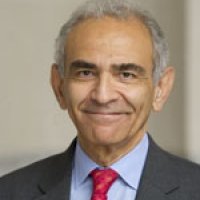Saddam Hussein’s Ba‘th Party: Inside an Authoritarian Regime

Joseph Sassoon, an Adjunct Professor at the Center for Contemporary Arabic Studies, Georgetown University and a former Wilson Center Public Policy Scholar, discussed the nature of Saddam Hussein’s Ba‘thist regime, including its durability, information-gathering, and sectarianism.
On January 23, the Middle East Program, International Security Studies, and the History and Public Policy Program hosted a book discussion of Sassoon’s latest book, Saddam Hussein's Ba‘th Party: Inside an Authoritarian Regime. Haleh Esfandiari, Director of the Middle East Program at the Wilson Center, moderated the event, and Rochelle Davis, an Assistant Professor at the Center for Contemporary Arab Studies, Georgetown University and a Wilson Center Fellow, commented on the book.
Sassoon began his discussion by explaining that he used materials from an Iraqi government archive that was captured by U.S. forces in 2003, as well as documents smuggled out of Iraq by Kurdish dissidents in 1991, to show how the Iraqi state, and in particular the Ba‘th party, functioned from 1968 to 2003. Sassoon then focused on three themes that emerged from this archive: the durability of the regime, the ability to gather information, and sectarianism.
Regarding the durability of Hussein’s regime, Sassoon noted that the Ba‘th party was only one of three pillars of the state, which also included the military and the bureaucracy. However, the Iraqi Ba‘th party was able to infiltrate both of these institutions and install its own members in the leadership. Sassoon also said that Hussein’s Ba‘th party used a policy of centralization, in which every major decision had to be approved by the party’s politburo. According to Sassoon, the underlying strength of the regime lay in the symbiosis between the regime and party, as well as Hussein’s ability to navigate intra-party rivalries. Hussein used a personality cult that forced blame for any mistake onto other leaders, ensuring his own supremacy both in the party and the government.
Sassoon stated that in order to gather information, the Ba‘th party emphasized recruitment over ideology. By 2002, 16.5% of the Iraqi population were Ba‘th party members, though only the top three levels of membership, which constituted only 2.5% of the population, had any decision-making role in the party. Sassoon also noted that as time went on, the party’s survival became more important than the implementation of Ba‘thist ideals. In order to co-opt the Iraqi populace, the Ba‘th party used a system of reward and punishment in which jobs, financial bonuses, and pensions were dependent on receiving certain party awards. As the sanctions of the 1990s took effect, the people became only more dependent on these rewards. Finally, while intelligence reports were found to be comprehensive and extensive, information was sometimes either falsified or withheld from Hussein because of both fear and embarrassment of failure.
On sectarianism, Sassoon briefly noted that the Ba‘thist regime never asked party members about their religious sect. Support of the party, rather than sect, was the most important factor for party intelligence, and many Kurds and Christians were part of the regime, while religious movements from all sects were persecuted.
Davis noted three important points that the book is notable for. First, while the book is structured by topic, it also explores each topic chronologically. Second, Davis noted that Sassoon had explored the large expansion of the party that took place in the 1990s. And third, she said the book shows the Ba‘thist bureaucracy to be “incredible” and noted the strength of the book lies in its presentation of new information and review of massive amounts of archival data.
By Daniel Magalotti, Middle East Program
Speakers

Professor, Georgetown University

Assistant Professor of Cultural Anthropology, Center for Contemporary Arab Studies in the Edmund A. Walsh School of Foreign Service, Georgetown University
Hosted By

Middle East Program
The Wilson Center’s Middle East Program serves as a crucial resource for the policymaking community and beyond, providing analyses and research that helps inform US foreign policymaking, stimulates public debate, and expands knowledge about issues in the wider Middle East and North Africa (MENA) region. Read more


History and Public Policy Program
A global leader in making key archival records accessible and fostering informed analysis, discussion, and debate on foreign policy, past and present. Read more
